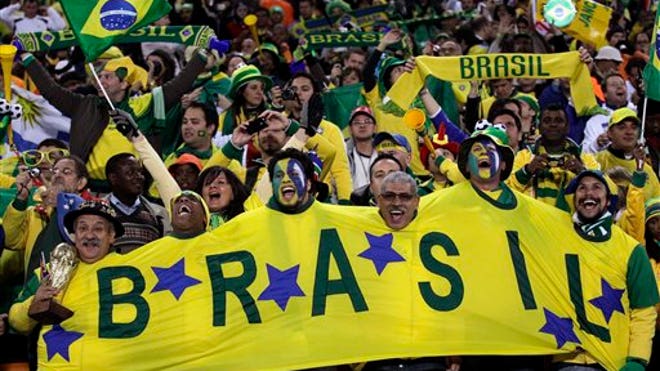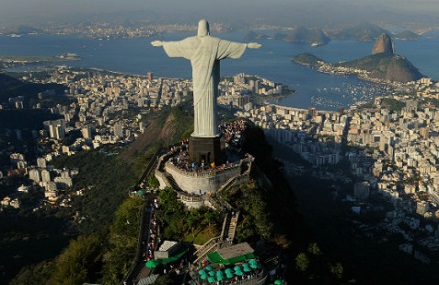 The nation of Brazil stands out as being distinct and notable for several reasons. It boasts the most successful and revered team in the FIFA World Cup Championship, holding the record for the most wins and being the only team to have played in every tournament. The nation has also made significant strides in the beauty industry, ranking third among 193 countries worldwide.
The nation of Brazil stands out as being distinct and notable for several reasons. It boasts the most successful and revered team in the FIFA World Cup Championship, holding the record for the most wins and being the only team to have played in every tournament. The nation has also made significant strides in the beauty industry, ranking third among 193 countries worldwide.
Religion is another facet of the Brazilian culture which has set it apart. The dominant religion of Brazil historically was Christianity – and it still is. The country possesses a richly spiritual society, primarily dominated by the Roman Catholic denomination. In fact, Brazil has become known as the country with the single largest Roman Catholic community worldwide. Brazil actually has twice as many Catholics as the Roman Catholic capital of the world: Italy. It is surprising to know, however, that from as early as 1891, Brazil ceased to be considered a Roman Catholic country and was declared to be secular.
Over time, Catholicism gradually lost its overwhelming dominance as more and more evangelical groups began to pop up and make their mark in the Brazilian society. The drastic fall in the number of Roman Catholic believers from a whopping 90 percent in 1970 to a now modest 54 percent, according to a 2013 study by the Pew Research Center, certainly raises some questions. What could have caused the drop?

Catholicism vs. Protestantism or Secularism?
At the onset of the 21st century, there were rapid changes in technology, economy and social standards, but for this nation it resulted in a noticeable growth in secularism (no religious affiliation) and evangelical Protestantism. People were now departing from Catholicism and embracing another, or becoming unreligious for a reason.
Andrew Chesnut, an expert on Latin American religions at Virginia Commonwealth University, said that the fastest-growing segment in Brazil’s religious landscape may now be nonbelievers and people unaffiliated with any church, making up as much as 15 percent of the population. Brazil has seen a general rise in secularization and indifference to religion. This is mainly happening in the south of Brazil but is evident in a lesser proportion in other areas. According to a report in Fox News Latino,Bruno Maragato, an ex-believer in the Catholic faith, stated that religion did not stick with him, and that "the church was much more a part of the lives of Brazilians in the past than it is today.”
He said that young people can now find other ways of thinking, and I would concur, given the new technological age which brings information and resources concerning many schools of thought at their fingertips. Church leaders are left faced with the challenge of dealing with the struggle to hold on to remaining believers, and guard against them making the decision not to make organized religion a part of their lives. More and more young people under the age of 20 are deciding not to follow any form of religion. The number is growing three times more quickly than that of those over the age of 50.
The Constitution of Brazil guarantees freedom of religion and prohibits government affiliation with or hindrance of religion at all levels. Evangelical Christians have taken on a more modern approach and are adopting more radical and relatable means of reaching the lost. These evangelical groups have translated their numbers into a growing political clout; in the meantime, the Roman Catholics are prohibited from being involved in government.
The masses feel a sense of representation by these religious groups, which potentially have a say in their welfare. They facilitate drive through prayer centers for busy commuters and rehab centers for the dispossessed. One such center is located in an area called "Crack-Landia” in Sao Paulo, where the congregants are mainly drug addicts and prostitutes. They are provided with a free meal and the opportunity to receive treatment for their addictions at evangelical rehab centers.

Despite the denominational shift, Brazil still remains one of the countries with the largest number of Christians. Russia, U.S., and Mexico are a few others that have a large Christian influence. With the usual solemn and pious approach that is often taken towards worship in the Roman Catholic faith, it is surprising to know that they are not going down without a fight. Despite the challenges facing Catholicism in Brazil, those committed to the faith are devising strategies for luring followers back into the fold. It is reported that at one new mega-church in Sao Paulo, a Roman Catholic priest who was a personal trainer before he joined the clergy, belted out songs rock-star style before 25,000 worshippers. Other priests are donning cowboy hats and crooning country tunes at their mass services. It can be considered completion for the more liberal evangelical churches that have been increasingly "stealing sheep.”
With the current state of religion and the upcoming 2014 FIFA World Cup, Brazil is ripe for missionary intervention. Missionary groups all over the world are making preparation to make the journey with the purpose of winning souls for Christ amidst the festivities. One such team is the YWAM kickoff, which is an arm of the well-known missionary organization Youth With a Mission.
The YWAM kickoff was created with the vision of reaching the lost through sports. This team was founded by Tim Stire about 37 years ago, and has been growing progressively and impacting the world for God through an activity loved by many.
People from all walks of life will be attending the World Cup this summer. The YWAM kickoff is setting plans in motion to effectively witness during this month-long celebration. YWAM is working on a technological tool called Light Stream. This device will allow them to electronically send Christo-centric films and the Bible in both written and audio forms to people electronically. On their mobile devices, sports fans can download for free after they leave the World Cup. It is a more effective approach, as attempts to hand out paper Bibles during this event to people who are on an "entertainment high” would prove futile.
Why would the World Cup be considered fertile missionary soil?

Joe Novelo, missionary to Brazil, told NEWD, "In some countries, Christianity is considered a poor person’s religion.”
The fact is that the opportunity to meet physical needs prepares the platform for sharing truth that can minister to their spiritual needs. Novelo stated that people from across the world who would travel to this huge sporting competition would more than likely not be poor people. This lends the opportunity to witness to a wealthier group, which is not usually widely evangelized.
Brazil is itself the second largest missionary-sending country, sending 34,000 missionaries in 2010, only second to the U.S., which sent 127,000. With such statistical prominence, it raises the question, "if so many missionaries are sent out into the mission field, why is there a need for other countries to come into Brazil to witness?” One would think that there would be enough locals who would reach out to the unbelievers and attempt to evangelize them.
Novelo, himself being a missionary in Brazil for 6 years, said that the crucial need for missionaries was not in the city but in areas where there are unreached groups. He went on to explain that an unreached group is a group that has less than a 2 percent Christian population.
The Amazon jungle, where a group of unreached people called River People live, is where the greatest need exists. The local churches in Brazil, he said, are usually very small and not equipped for reaching these groups, as they are only reachable by boat. Not only don’t they possess the necessary transportation to venture into these areas, but they are usually not financially equipped enough to cater to the health and living needs that this group of people has. These River People live on limited resources and get very little or no health care. Most of them do not enjoy the luxury of electricity or phone service. Local churches, being unable to meet these needs, are generally unable to access these people to evangelize to them. Novelo and his YWAM team have used boats to travel to the Amazon with doctors and dentists who provide free health care. The teams usually show Jesus films and introduce the people to the love of Jesus.

In general, Brazilians are receptive to evangelism, but it is more difficult to talk to people with a Catholic background. They view their salvation as being tied to their church while the evangelicals see their salvation as being tied to their relationship with God.
Brazil continues to maintain prominence on the world map, and the fact that they will be honored to host both the next World Cup in June 2014 and the Olympics two years after, says something about their greatness.
The nation has and continues to observe God, and with continued outreach and evangelism there is hope that they will regain a World Cup title, an Olympic win, and a 100 percent Christian nation.
View this video from YWAM about their World Cup 2014 evangelism strategy.

